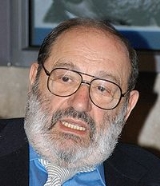
Umberto Eco
Umberto Eco is an Italian philosopher and novelist.
See also:
See also:
- Foucault's Pendulum (1989)
- The Island of the Day Before (1994)
Sourced
- The day after the fall of Khrushchev, the editors of Pravda, Izvestiia, the heads of the radio and television were replaced; the army wasn't called out. Today a country belongs to the person who controls communications.
- From Il costume di casa (1973); English Edition: Travels in Hyperreality (1986)
- Semiotics is in principle the discipline studying everything which can be used in order to lie. If something cannot be used to tell a lie, conversely it cannot be used to tell the truth: it cannot in fact be used "to tell" at all.
- Trattato di semiotica generale (1975); [A Theory of Semiotics] (1976)
- Variant: A sign is anything that can be used to tell a lie.
- In the United States, politics is a profession, whereas in Europe it is a right and a duty.
- Preface to the American edition of Travels in Hyperreality (1986)
- To read fiction means to play a game by which we give sense to the immensity of things that happened, are happening, or will happen in the actual world. By reading narrative, we escape the anxiety that attacks us when we try to say something true about the world. This is the consoling function of narrative — the reason people tell stories, and have told stories from the beginning of time.
- Six Walks in the Fictional Woods (1994) Chapter Four: "Possible Woods"
- Reflecting on these complex relationships between reader and story, fiction and life, can constitute a form of therapy against the sleep of reason, which generates monsters.
- Six Walks in the Fictional Woods (1994) Chapter Six: "Fictional Protocols"
- After all, the cultivated person's first duty is to be always prepared to rewrite the encyclopaedia.
- Serendipities: Language and Lunacy (1998)
- I don't miss my youth. I'm glad I had one, but I wouldn't like to start over.
- "On the Disadvantages and Advantages of Death" in La mort et l'immortalié, edited by Frédéric Lenoir (2004).
- A democratic civilization will save itself only if it makes the language of the image into a stimulus for critical reflection — not an invitation for hypnosis.
- Information Control For Social Manipulation in Nexus Magazine (2004)
The Name of the Rose (1980)
- Il nome della rosa (1980); The Name of the Rose (1983)
- There are magic moments, involving great physical fatigue and intense motor excitement, that produce visions of people known in the past. As I learned later from the delightful little book of the Abbé de Bucquoy, there are also visions of books as yet unwritten.
- A monk should surely love his books with humility, wishing their good and not the glory of his own curiosity; but what the temptation of adultery is for laymen and the yearning for riches is for secular ecclesiastics, the seduction of knowledge is for monks.
- Books are not made to be believed, but to be subjected to inquiry.
- William of Baskerville
- "That man is ... odd," I dared say to William.
"He is, or has been, in many ways a great man. But for this very reason he is odd. It is only petty men who seem normal."
- I started to write [The Name of the Rose] in March of 1978, moved by a seminal idea. I wanted to poison a monk.
- Quoted in Myriem Bouzaher's introduction to the French version of The Name of the Rose, Postille al Nome della Rosa, Page 18 (1985)
